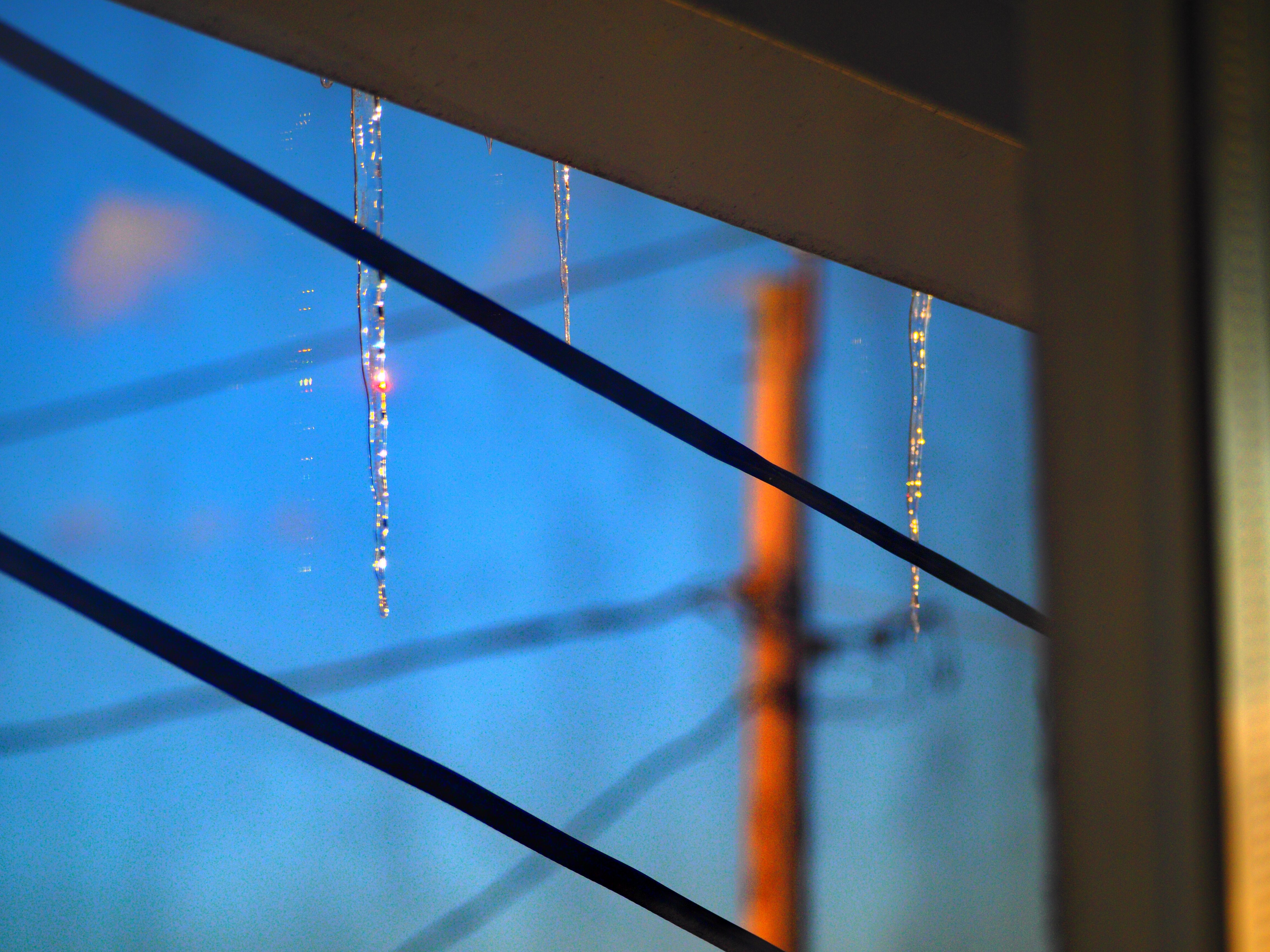-
Posts
44,789 -
Joined
Content Type
Profiles
Blogs
Forums
American Weather
Media Demo
Store
Gallery
Everything posted by LibertyBell
-
Wasn't the February 14-15, 2014 occurrence during a snowstorm, Don?
-
What's causing this similarity, is it because the higher winds are equalizing temperatures across the region, Don?
-
I know we do lol. Just not right up next to the road lol. How come there's so many different terms used to describe the same thing 1) wetlands 2) marshes 3) swamps?
-
crystal clear blue skies are aesthetically very pleasing but not exciting weatherwise lol. This was a great day though, maybe the best out of the next 10. If it's windy later this week you'll see me complaining about allergies lol.
-
Pesticides are more trouble than they are worth. I grow my own veggies organically without any. We have carcinogenic pesticides in our water here on Long Island, the consequences of farm runoff. This is something where technology can come to the rescue, large farms are now using laser powered drones to effectively zap pests. I don't mind the pesticides you've mentioned those are pretty safe. My issues are with organophosphates and 3,5-Dioxane.
-
Could there be a big noreaster with very high winds as we have seen at the end of October before?
-
Sounds like a winter pattern setting up. The end of October for whatever reason is one of those periods in which strong noreasters are common, so maybe we will have a big rain and wind event? If so, the noreaster pattern is setting up early this season.
-
I don't spray anything outside, just inside, when mosquitoes come inside they are fair game. The ones that come inside are very aggressive, I've been chased across my house by mosquitoes. I guess the ones that come inside are of the extra aggressive variety? And now we have that new tropical parasite to worry about. I do let spiders handle most indoor insects. There's a spider in one of my windows that grabs mosquitoes and other insects regularly (even hornets). It fascinates me, it's a small spider and some of the insects it gets are up to 3x its size. I had to use Permethrin on my clothes because last summer I found 6 black legged ticks on my clothes and would have to undress and leave my clothes outside submersed in a bucket of water and change clothes in my garage. This was even with Permethrin on my clothes, so I'm not sure how effective it was. Along with reduced pollinator populations, I'm not sure if people realize how fragile our entire ecosystem is, even our monotype agriculture is one step away from being completely wiped out. We have unsafe drinking water here, our aquifers have been found to have a carcinogenic pesticide that has infiltrated our drinking water so I've put a whole home six stage filter on our water, which I have to change once a year. The wild thing about coal is, it creates more radioactive waste than nuclear fission does and yet people are more worried about nuclear power for some reason. I understand that nuclear isn't without risk, but coal is so much worse.
-
this is the ideal day, even the wind is much less than it was yesterday. these frequent frontal passages are a fly in the ointment though (but a sign it's Fall.)
-
I know about your credentials, we've discussed them before and I respect them. But why are you using insecticides in mice nesting material? As a scientist you must be aware of the effect this has on local bird populations that feed on mice, like owls? There has to be a better way that doesn't impact other wildlife, such as birds. I had an invasion of ticks at my other house in the Poconos when a deer crashed into my pool and died there. Most of the ticks that I saw that summer were black ticks. I bought something to spray on my clothes as a tick repellant-- permethrin. I also read that opossum are the most efficient way to deal with ticks, as they are their main natural predator. So I've been encouraging more opossum onto that property and the ticks have been going down. We have opossum here too even though I live in a semi-urban area, I think they would be a great way to drive down the tick population without using chemicals. I am well aware of Lyme disease and how it's spread to other areas. I blame stupid humans who decided that it's better to remove predators like coyotes and wolves and cougars that feed on white tailed deer who are the primary vector of the tick that carries Lyme disease. Maybe if humans didn't kill off the predators we wouldn't have an explosion of white tailed deer. I think you misinterpreted what I stated, I never said we should remove ALL wetlands, just trim them back from highly populated areas. As for drainage, not using concrete and asphalt would help with drainage as well as helping with urban heat island. I'm all for more greenery, as in more trees and native plants and grasses, less of the invasive stuff that has become so common here. I am 100% against pesticides. They are the main driver of the 6th mass extinction in the planet's history, as much of a problem as climate change is. And are destroying our own systems of food production by causing the collapse of pollinator populations. Something I always like to say is that humans are part of the environment, we can't consider ourselves separate from it, because what we do to it, we also do to ourselves. We're all interconnected. As far as mosquitoes are concerned, malaria is one of the top killers on the planet and there are many other mosquito borne diseases. We have better ways than using toxic chemicals. Bill Gates idea of using sterilized genetically modified mosquitoes is one of them to control their populations. By the way, thanks for mentioning microplastics. Did you know that 6 out of 13 types of cancer are on a rapid rise even in younger people because of a combination of highly processed food, microplastics in food as well as environmental toxins like pesticides? It seems like we are going backwards and regressing. Humanity isn't sustainable in its current form.
-

Occasional Thoughts on Climate Change
LibertyBell replied to donsutherland1's topic in Climate Change
Yes this is how that would work, each inflationary period has to last longer. Here's something else interesting, the finding that dark energy oscillates and is now slowing down. We might be at the cusp of a contracting universe as the cosmological constant doesn't seem to be constant anymore. The universe might be hitting middle age as it were. By the way something else that goes along with this whole cosmic DNA idea is that a universe with life is more likely to give birth to another universe that has life in it. It transfers at least some of its physical properties to its offspring. There might be some random cosmic mutations that make certain things different (just like we have in biology). These could be the *improvements* you mentioned (in some cases.) Do you know what one improvement might be? Have life develop more early in the universe's history and even sentient life earlier on. That might make it easier to travel between systems and get around some of the unsustainable aspects of life (and at an earlier stage of the universe there was likely much more energy available to use as a resource.) -

Occasional Thoughts on Climate Change
LibertyBell replied to donsutherland1's topic in Climate Change
Yes this analog is perfect to describe how death and birth are part of a (nearly) endless cycle. I don't think the cycle is truly endless though, at some point the entire mechanism runs out of fuel (as it were). By the way, for the cyclic model of the universe there is a specific requirement to get around entropy, it is that the next new universe has to be larger than the one preceding it. I'm not sure how this applies to offspring although maybe there is something in there that eventually drives the whole process to a halt. I don't think true immortality is possible or that we should ever even desire it. It would probably just create a spike in the suicide rate. -

Occasional Thoughts on Climate Change
LibertyBell replied to donsutherland1's topic in Climate Change
Breeding itself is by definition a diminishing return because of limited resources and finite land (unless we colonize space). It results in overpopulation. The road to evolution is also the road to the destruction of the evolving species. Human nature itself is unsustainable. The planet will be fine, it has a natural tipping point to take care of the offending species It will always choose biodiversity over the dominance of one species, it self regulates just like the Gaia Hypothesis conjectures. -

Occasional Thoughts on Climate Change
LibertyBell replied to donsutherland1's topic in Climate Change
There is a way around the Second Law of Thermodynamics (Entropy) as far as the universe is concerned. In the cyclic model this is achieved by the universe coming back *empty*. In other words all of the universe's matter becomes part of a black hole. The black hole represents the maximum state of entropy possible. But..... with a specific type of black hole called the Kerr Black Hole (a spinning black hole), this maximum state of entropy can give birth to a new universe. The recent discovery of our own universe spinning is strong evidence in this regard (just like it is strong evidence of a multiverse, for our universe needs an outside frame of reference it is spinning in comparison to.) If this is correct, our universe itself is inside a spinning Kerr Black Hole inside a larger superverse. -

Occasional Thoughts on Climate Change
LibertyBell replied to donsutherland1's topic in Climate Change
I have an idea for how the limitations of biology can be overcome, what about inorganic bodies that can house our consciousness? Maybe that would enable the species to think more logically and not be so dependent on organic compounds (which is what fossil fuels are)? We would be automatically immune from all diseases too. -

Occasional Thoughts on Climate Change
LibertyBell replied to donsutherland1's topic in Climate Change
I've always believed the Great Filter lies ahead of us, there are some barriers that most sentient species simply cannot cross. Did you know that research has been done showing that human intelligence peaked about 3000 years ago and has been declining ever since? Dependence on technology, the industrial revolution, etc., all make humanity unsustainable. -
I think those 3-6 inch rainfall amounts are somewhat overdone, 1-2 inches are more likely. That's what we need, heavier rainfall would just cause flooding and not help drought concerns.
-
But that tropical system will probably remain offshore and the front will just funnel the moisture up here without any of the high winds?
-
1743: On the evening of the 21st Ben Franklin had hoped to observe a lunar eclipse in Philadelphia but cloudy skies from a VA coastal storm hide the moon. Franklin later learned from sources in Boston that the same eclipse seen in clear skies in the NE but a violent storm hit them the next day. Franklin reasoned that it was the same storm and that weather moves.(Washington Weather Book 2002 by Ambrose, Henry, Weiss) It puzzled Franklin that the system seemed to move from southwest to northeast even though winds at his location were from the northeast. He theorized the winds in the storm system must have been rotating around a center. A brilliant deduction considering he had no satellite to show the big picture.(Ref. AccWeather Weather History) I would much rather see the eclipse 1996: A state of emergency was declared in Massachusetts, New Hampshire and Maine after a powerful coastal storm dumped over a foot of rain causing massive flooding. Portland, ME recorded 7.92 inches of rainfall in 24 hours to set their rainfall record.(Ref. AccWeather Weather History) Boston, Massachusetts on the 20th and 21st had the greatest 24 hour precipitation of 6.66 inches for the month of October. (Ref. NOAA Boston Weather Events) How much rain did this storm drop here? I don't remember it at all Tony.
-
it's close to 70 here now
-
where exactly is this rain coming from Don?
-
Today it could hit 70 here
-
Isn't bamboo an invasive species? Why don't people get arrested for doing this crap?
-
Out of the box thinking is not *dumb*, just because you're an unimaginative uncreative robot. I've read some of your posts, so I know. The conventional *ideas* that people like you have will NOT get us out of the various crises we face. It's not *dumb* to want to get rid of places that stink. I'm not talking about getting rid of ALL marshland obviously, just the ones near where people live. You obviously do not live near one. Do you know how bad that area smells in the summer? Most of the who live here want the swamp that runs near Rockaway Boulevard to be drained because it smells so awful that you can smell it even with your windows roll up. Check yourself, there's plenty of good area for wetlands, but it doesn't have to be near where people live. You might need a time out, people are allowed to express their opinions. There are ways around flooding-- INCLUDING IMPROVED DRAINAGE SYSTEMS. There's a lot we can do to fix flooding issues, stop using concrete and asphalt are examples. Take some Paxil so you can calm the hell down dude.
-
Bill Gates has the right idea, he has introduced sterile genetically modified mosquitoes that can't breed into Florida to lessen malaria and other diseases that they carry. So different types of mosquitoes behave differently? I get rid of standing water right away, it breeds not just mosquitoes but other biting bugs like horseflies and gnats.



